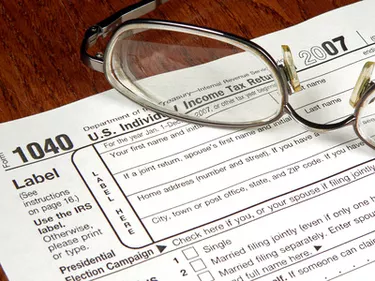
When a decedent dies, a separate taxable entity – a decedent estate – is created. An appointed fiduciary administers the decedent's estate. This person gathers assets, files the decedent's final income tax return, settles income tax liabilities and oversees any testamentary trusts.
The estate pays the taxes on the income that's received during the estate's administration and the fiduciary oversees the preparation of tax forms, including the final tax return and needed estate and gift tax returns.
Video of the Day
Video of the Day
Filing the Final Tax Return
After the death of a decedent, a spouse or executor must decide who should file the final income tax return. As with a tax return for a living taxpayer, the executor must file the Internal Revenue Service (IRS) Form 1040. When completing this form, the executor must document the date of the person's death.
Also, in the year of the death of the deceased, the surviving spouse, trustee, executor or administrator should file the IRS Form 56, which alerts the Service as to the person who is responsible for filing the final tax return for the deceased. This return will report the income of the deceased up to the person's date of death as well as claim the credits and deductions the deceased can claim.
Filing Status of Deceased Tax Return
The surviving spouse can file a joint return in the year of the spouse's death. Unless the surviving spouse remarries during the year of death, the spouse can use the married filing jointly status. Otherwise, the appropriate filing status for the tax return of the deceased is married filing separately.
Consider also: What Happens If Taxes Aren't Filed for a Deceased?
IRS Forms for Deceased Tax Return
- W-2, 1099: Forms that report income earned and expenses paid during the deceased person's year of death.
- IRS Form 1040: A form the estate's administrator will use to report wages, salary, taxable interest, capital gains, pensions, Social Security benefits and other types of income for the deceased taxpayer's year of death.
- Death Certificate: A legal document that a medical examiner or civil registration office issues that states the date, location and cause of death of a deceased taxpayer.
- IRS Form 56: A form that a trustee, executor or administrator files to alert the IRS of the person responsible for filing the deceased person's tax return.
- IRS Form 1310: A form the administrator must file if the last tax return of a deceased person indicates that a refund should be issued to a decedent's estate.
- IRS Form 1041: A form an administrator files for an estate of a taxpayer who will receive more than $600 in income after the death of the taxpayer.
Consider also: Rules for Filing Taxes After Someone Dies
IRS Publication 559
The IRS Publication 559 informs survivors, executors and administrators as to the requirements for filing a tax return for a deceased taxpayer by April 18, 2022. Alternatively, these individuals may seek the support of an attorney, CPA or another expert with the tax requirements for a large estate.
Income Taxes Filing Extension
A tax filing extension is a means an administrator can use to request additional time to prepare and file a tax return. It does not, however, grant additional time to pay taxes due.
The administrator is required to file a tax return or a request for a filing extension by April 18, 2022. Consequently, at the time the administrator files for an extension, she must estimate the taxes due and send that amount to the IRS. Later, when the administrator files the tax return, she should send any additional amount that's due or use Form 1310, Statement of Person Claiming Refund Due a Deceased Taxpayer, to request a refund for the estate of the deceased taxpayer.
It should be noted that the decedent's tax return should include the income the taxpayer received up to her date of death. Income received after that date is reported using a separate Form 1041.